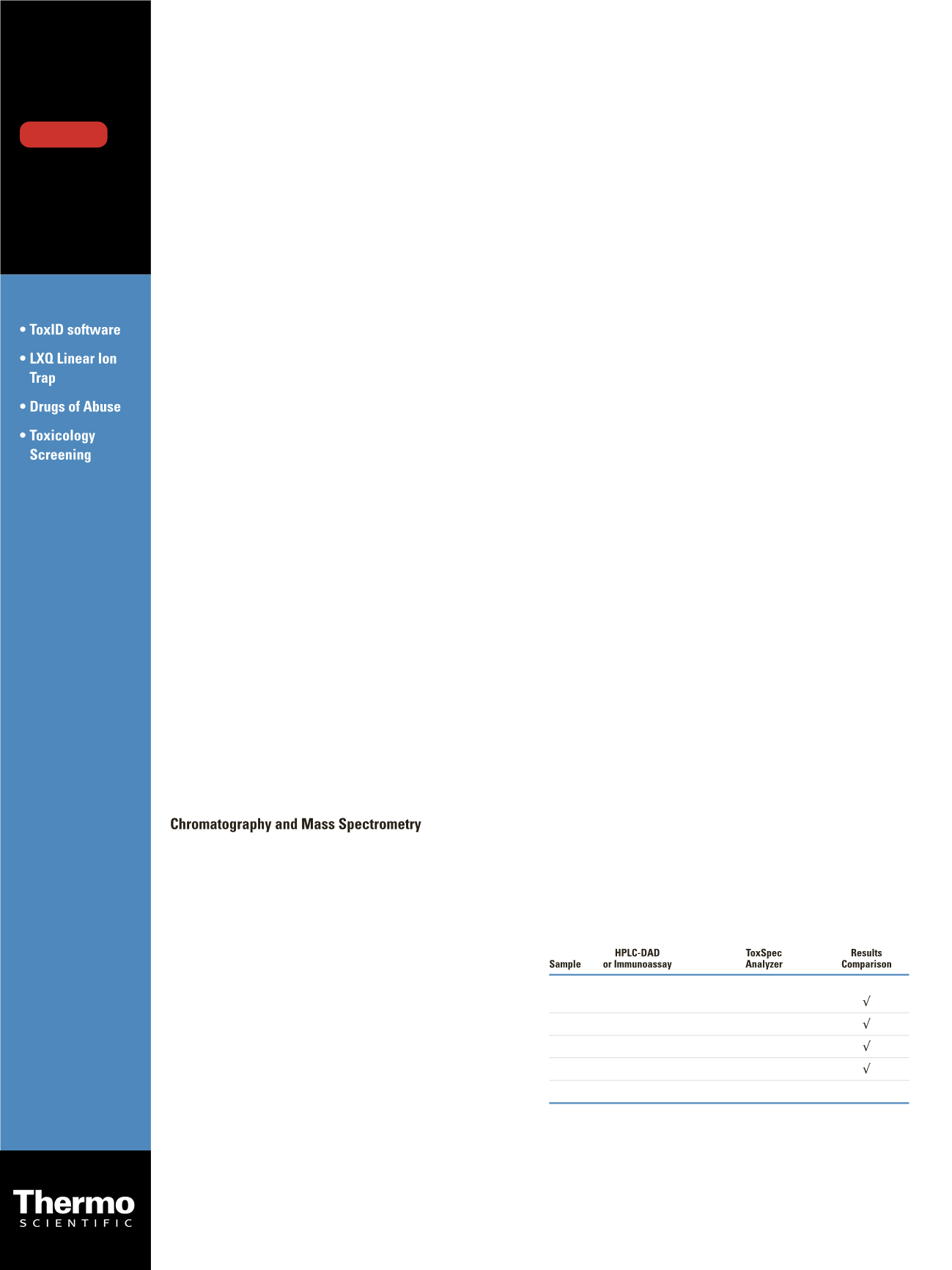

Application
Note: 517
Key Words
Screening for Drugs and Toxic Compounds:
Comparison between
lc-ms
/
ms
,
hplc-dad
,
and Immunoassay
C. Gechtman
1
, A. Masarin
1
, S. Scurati
2
;
1
A.O. Ospedale Niguarda Cà Granda, Milano, Italy;
2
Thermo Fisher Scientific, Milano, Italy
For Forensic Toxicology Use Only.
Introduction
Screening of biological samples for drugs of abuse and
other toxic compounds is a critical feature of forensic
toxicology laboratories. The main challenge is to provide
rapid and accurate results despite the large number
of target molecules and the complexity of biological
matrices. The classical approach is based on immunoassay
or high pressure liquid chromatography-diode-array
detection (HPLC-DAD). However, the advent of newer
and more effective liquid chromatography-tandem mass
spectrometry (LC-MS/MS) technologies can lead to a
significant improvement in non-targeted screening.
Goal
Evaluate the Thermo Scientific ToxSpec Analyzer, LC-
MS solution for forensic toxicology screening, for non-
targeted screening of several compounds in human urine.
LC-MS technology is used to increase the confidence of
identification and to simplify the workflow in a forensic
toxicology laboratory when compared with the classical
screening approaches.
Experimental
Sample Preparation
Urine was stored at -20 °C for the analysis. After thawing,
the sample was diluted 1:10 with water. For the analysis,
20 µL of diluted urine were directly injected.
The ToxSpec™ Analyzer was used for the analysis.
Briefly, for the LC separation a Thermo Scientific Hypersil
GOLD PFP analytical column (50 x 2.1, 5 µm) was used,
with mobile phase A (10 mM ammonium formate in
0.1% formic acid) and B (ACN containing 0.1% formic
acid). The gradient was from 95% A to 95% B in about
5 minutes with a flow rate of 200 µL/min. For the MS
analysis, a Thermo Scientific LXQ linear ion trap mass
spectrometer equipped with an electrospray ionization
(ESI) source utilizing polarity switching was employed. A
data dependent scan collected MS/MS spectra of all the
compounds eluted. Data generated were processed with
Thermo Scientific ToxID automated screening software.
ToxID™ software identifies compounds on the basis of
retention time, precursor ion, and MS/MS spectrum.
Samples screened by LC-MS/MS were previously analyzed
also with immunoassay or HPLC-DAD, allowing a
comparison between methods.
Results and Discussion
The ToxSpec Analyzer is able to process a sample in about
15 minutes, which allows the performance of routine
screening analysis. Data obtained are highly specific and
reliable because the identification of compounds is based
on three peculiar characteristics of the molecules: retention
time, precursor ion, and MS/MS spectrum. Figure 1 shows
a report generated by ToxID software after the analysis of
a urine sample that tested positive for LSD.
The comparison of results obtained by analyzing the
same urine samples with different screening approaches
has given interesting results (see Table 1). The ToxSpec
Analyzer confirmed, for the most part (Urine 1-4), the
results obtained with HPLC-DAD or an immunoassay, but
also identified additional compounds, such as metabolites
or other minor components that were not recognized with
other screening approaches.
Surprisingly, in Urine 5, the results are clearly not
in agreement. Particularly, the immunoassay identified
amphetamines, while the ToxSpec Analyzer method
identified ranitidine and metoclopramide, two therapeutics
drugs often used in combination. To better understand the
difference between the techniques, we compared the MS/
MS spectra of the molecules detected in Urine 5 with those
present in the library.
Urine 1
Cocaine
Cocaine, Benzoylecgonine,
Cocaethylene, Nicotine
Urine 2
Ketamine
Ketamine, Norketamine
Urine 3
Quetiapine
Lidocaine, Quetiapine
Urine 4
LSD
OH-LSD
Urine 5
Amphetamines
Ranitidine, Metoclopramide
X
Table 1. Comparison of results obtained analyzing the same urine samples
using different screening techniques.
DOWNLOAD


















